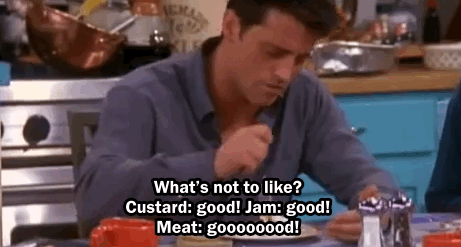via GIPHY
Who loves From Dusk Till Dawn?
I loved it back in the day, but it was polarizing: Tons of people HATED how the movie rebooted from a crime film to a vampire film, and they have a point. I loved that film because I knew it was a vampire film that was hiding in a crime film. I thought, "What's not to like? Crime films, good! Vampire films, good!"

But what if I wasn't expecting the switcheroo? Without the film's marketing campaign making the reboot contained in the movie explicit, I might have been repulsed. Expectations are everything: Don't dress your audience for the pool and take them skiing.
And yet, so many writers lose their way and reboot their stories in the chase for 100 pages. They convince themselves that it's not a reboot, but an enlargement of the same story.
So how can you tell the difference between a reboot and an enlargement? I think you have to look at the protagonist's BIG-WANT. If the big-want changes, you're rebooting, and without a marketing campaign to prepare them, your audience is going to hate it.
Look at From Dusk Till Dawn (SPOILER, and how have you not seen this yet!): At the start of the film, the main protagonist, Seth (Clooney) big-wants to save his brother, Richard (Tarantino). That means if Richard dies in the middle of the movie, this story becomes a reboot (again, SPOILER: He does).
That makes me wonder: Could this film have worked without the marketing campaign if Richard didn't die, at least until late in act three? Could preserving Seth's big-want throughout the whole picture have made crime and vampires work for a larger audience? I guess I'll leave that for discussion in the comments. But for now, let us at least see the lesson of preserving the big-want throughout the story in order to avoid a reboot.
If your protagonist big-wants to win the karate world championships in act one, don't have her skip her victory party late in act two in order to go pursue another big-want like rescuing hostages. This seems so obvious, doesn't it? But we're writers: Our own creativity can convince us of anything. I've been guilty. I've heard and made all the arguments below.
You may argue the hostage complication is an enlargement because she's gonna defeat the hostage-takers with karate. You see, she only THOUGHT she was training to win the championship, but then fate gave her a higher calling. Sorry, that's a reboot. If you wanted to tell us a karate-hostage-savior movie, you put that higher calling in act one.
Maybe then you argue the hostage complication is an enlargement by moving it to act three on the eve of the championships, giving the protagonist a choice between winning the championships or saving the hostages. In other words, if she rescues the hostages, she'll LOSE the championship. Okay, MAYBE that can work. It's a good idea actually to give your protagonist a choice to give up their big-want for a big-need, and in making that choice, becoming worthy of the big-want. But if you can't figure out how to organically get your protagonist back to the championship after rescuing the hostages, then sorry, that's a reboot.
Maybe then you argue that her big-want was never to win the karate world championships. She was just trying to make a boy notice her. The boy is her big-want. And the boy is a hostage. Okay, MAYBE that can work--until the second you have her freeing the little old lady first, and then asking the boy to join her in freeing the kindergarten class on the second floor. Yes, that makes her noble, but it reboots the story, because she's not putting the boy first anymore.
So what if she does put the boy first, and tries to rescue only him--but he won't let her do that without first going to rescue the little old lady and the kindergarteners? She has to be noble to keep his approval. Again, MAYBE that can work. It will probably still feel too jarring to have spent all this time training for a karate championship and then switching to a hostage rescue, but at least with a consistent big-want, you have a chance.
So always remember the big-want. Make it clear. Make it the biggest want in the movie. Never trump it unless your name is Quentin Tarantino. Hi Quentin! Loved From Dusk Till Dawn!
Big-Want Corollary: Movies so often escalate to protagonists saving the world because whatever big-wants they start with, they usually can't have them if the entire world ends. You can almost always argue that your story is enlarged and not rebooted by the need to save the world.
via GIPHY
No comments:
Post a Comment